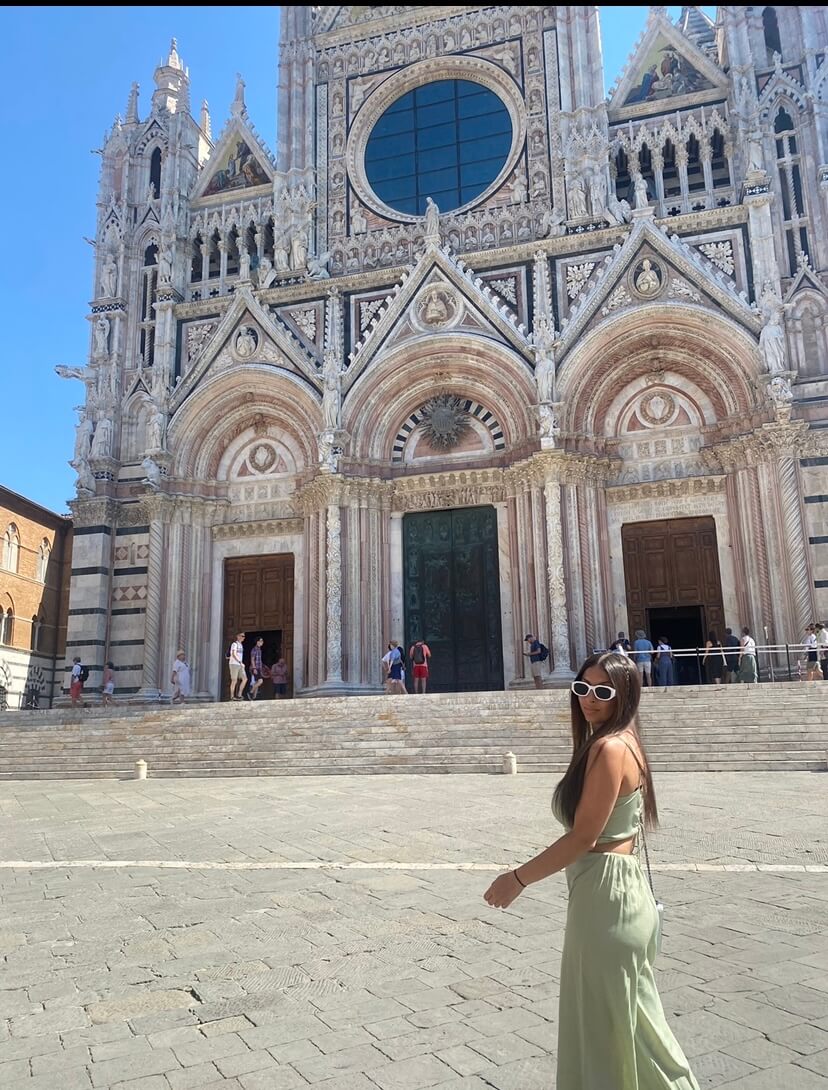
Correspondence
Discussion and reactions to our last issue. Plus, readers share their memories of living and studying abroad.
Re: Fall/Winter 2022 Issue
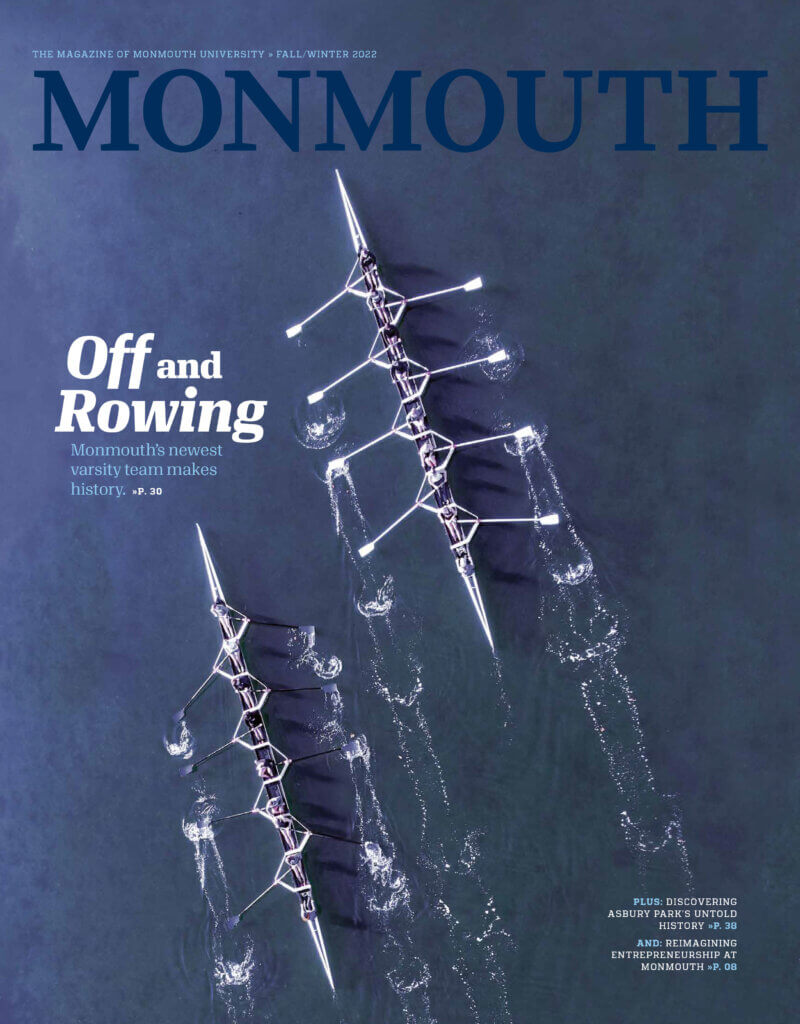
Your article on Associate Professor of English Stanley Blair’s comic book course brought back some fond memories. In the early 1970s, I taught an elective, The Comic Vein, at Red Bank Regional High School. Six weeks of this semester-long class was devoted to teaching the comic book. I used this media as a social barometer reflecting such issues as the women’s movement, the drug scene, wars, etc. I also attended the comic convention, which was organized by Phil Seuling, in New York City. One summer while there, I was able to book the artist for the Dracula comic book to come and speak to my students. I remember the publicity around this course, and while attending a class at Monmouth University, a woman walked in with boxes of old comics depicting women. It was a real find that complemented my Wonder Woman and The Cat comics. The class had some media coverage, and I was asked to do a slideshow presentation at the Monmouth County Library–Eastern Branch titled “The Comic Book As A Social Barometer.”
—John R. Hird ’73M
I love the magazine!
—Carolina (Feito) Menapace ’02
I really enjoyed the articles in the last issue!
—Pamela (Mobus) Levin ’72
Memories from Abroad
Thanks to all of the readers who shared their stories about living and learning overseas. Have a story you’d like to share? Check out this issue’s Looking Back article.
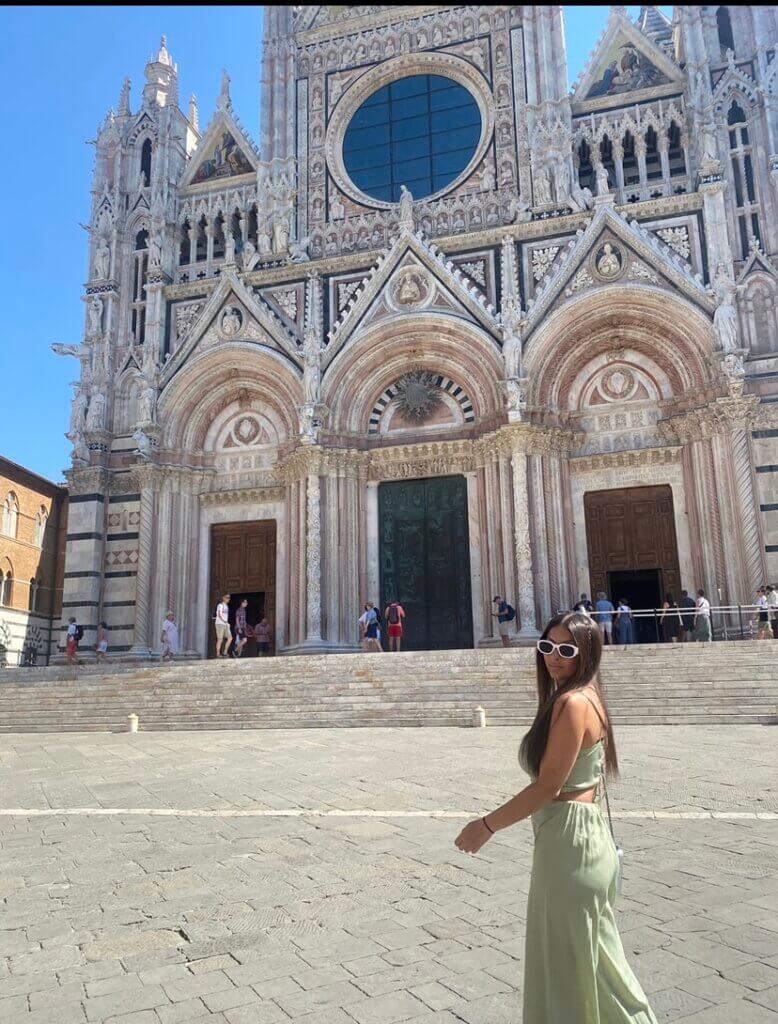
My desire to see what the world has to offer influenced my decision to spend my summer studying abroad in Florence, Italy. I spent a month traveling to 15 cities in three countries—kayaking in Switzerland, laying under the Eiffel Tower while it sparkled, cliff jumping along the Amalfi Coast, hiking Mount Vesuvius, and dancing through the streets of Italy with locals while learning their culture.
This experience was truly eye opening and presented me with many challenges to overcome: learning my way around a foreign city, overcoming the language barrier, and adapting to cultural norms. Studying abroad taught me more about independence and getting out of my comfort zone more than I could have ever imagined. I learned that there is no greater teacher than travel. When you step outside of your norm, it forces you to open your eyes to the world and all of the countless possibilities. This helps you learn to appreciate the things that are the same at home and things that are different where you are.
I am beyond blessed to have had this experience and it is something that I will remember for the rest of my life. I know I will be going back again one day.
—Kaitlyn Alavarces ’23
I made the decision to study abroad in my freshman year. I eagerly attended the prep meetings between classes so I could be ready to go on an adventure in my sophomore year. At that time, there were only two options for international study: England or Australia. I desperately wanted to travel to Australia, but my parents were against it. My mother was from England—she moved to the U.S. in 1988—and she agreed that I could study abroad if I went to England. This was going to be my first trip out of the country on my own, and my parents, being protective of me, wanted there to be family nearby in case of an emergency. I understood, and even though I was disappointed at first, that feeling later turned into delight. I was still getting to go on an adventure!
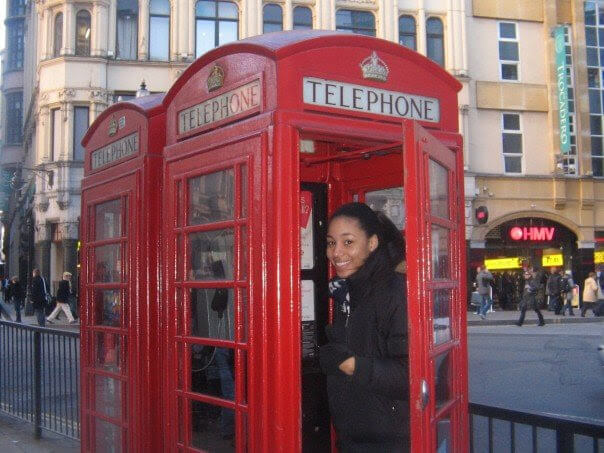
I had been to England as a child to visit family, but that was about it, and little of that time was spent in the cities. It was typically spent in my mother’s childhood home in Great Yarmouth, a coastal town north of London. Studying abroad was going to be vastly different. I was going to be spending four months in the heart of London studying at Regent’s University in the middle of Regent’s Park. I would have the giant city of London at my fingertips, but I also would have London as my base of operations because a diverse collection of countries were only a stone’s throw away for me to visit. It felt like a fairy tale.
I went through the motions and, with the help of the excellent Monmouth University staff running the study abroad program, I got my visa in order and was ready to set off for the spring semester of my sophomore year. I was nervous at first flying on the plane by myself, but I quickly got to know some of the other students and it was easier after that. Upon arrival we were ushered to our new homes to settle in. I realized that I was slightly ahead of the curve compared to my fellow students in terms of adjusting to day-to-day life. I found that others struggled with finding foods they were willing to eat or even figuring out English slang and turns of phrase. Since I’d already had a taste of English culture, there was little adjustment that I had to make beyond resetting my sleep schedule. I tried my best to convince people to give beans on toast or a chip butty a try, but to little avail.
I tried to spend as little time possible cooped up in my dorm room, and between classes I was out exploring London. The city had so much to offer with places to go and things to see. I got to see Parliament and Big Ben, London Bridge, Trafalgar Square, Piccadilly Circus, the Tower of London, Buckingham Palace, Shakespeare’s Globe—the list goes on. And I made sure to use my semester abroad as the time to take my degree electives and was lucky enough to get into a Theater Appreciation class, which meant I was able to see a West End play every other week.
I spent my weekends either exploring the London nightlife with friends or taking trips. I’d never been able to afford to book a flight for myself, and I happily took advantage of the 40-pound flights out of Heathrow, Gatwick, and Stanstead airports. I traveled to Barcelona, Nice, and Paris, all on a college budget and with a bit of assistance from my mother (thank you, Mom!). I also had the luxury of visiting Italy over Spring Break and spending a week in Florence. I ate Nutella crepes outside of the Notre Dame de Paris and slurped down basil pesto linguine while gazing up at the Duomo di Firenze. So many good memories made and so many exquisite meals!
Arriving back in the U.S. after my semester abroad felt so strange. I was glad to be home, but I had to re-acclimate myself to what life was like. I couldn’t just ride the tube to wherever I wanted, and I had to get back into the swing of driving everywhere. But I also remember feeling so much more independent. Before I left, my parents took care of so many things for me, like setting up doctor’s appointments or taking care of my bills. But after having to deal with everything on my own for a couple of months, I realized that I was absolutely capable of taking care of myself, and I slowly realized that I could do the same thing at home.
If there are any students out there considering whether or not they should study abroad, I say, take the plunge and do it! You will never get an opportunity like this again in life, where you have the freedom to experience another place and culture unencumbered by the other areas of your life such as work or life responsibilities. The experience will help you grow as a person and become more independent, well rounded, and understanding of those different from you. I grew so much from my study abroad experience, and I still carry the lessons I learned there with me. If I had the chance to do it all over again, I would.
—Natalie Jordan ’09
With the encouragement and permission of Dr. Robert Pike, chair of Monmouth’s foreign language department in 1965, I enrolled on my own at the University of Paris (the Sorbonne). It was my junior year abroad. How exciting!
The courses, all taught in French, included French history, literature, grammar, geography, and history of ideas in modern France, to name a few. In retrospect, it was quite economical. Tuition was $50 a semester, and $100 a month was more than sufficient for room and board and minor expenses. My, how times have changed!
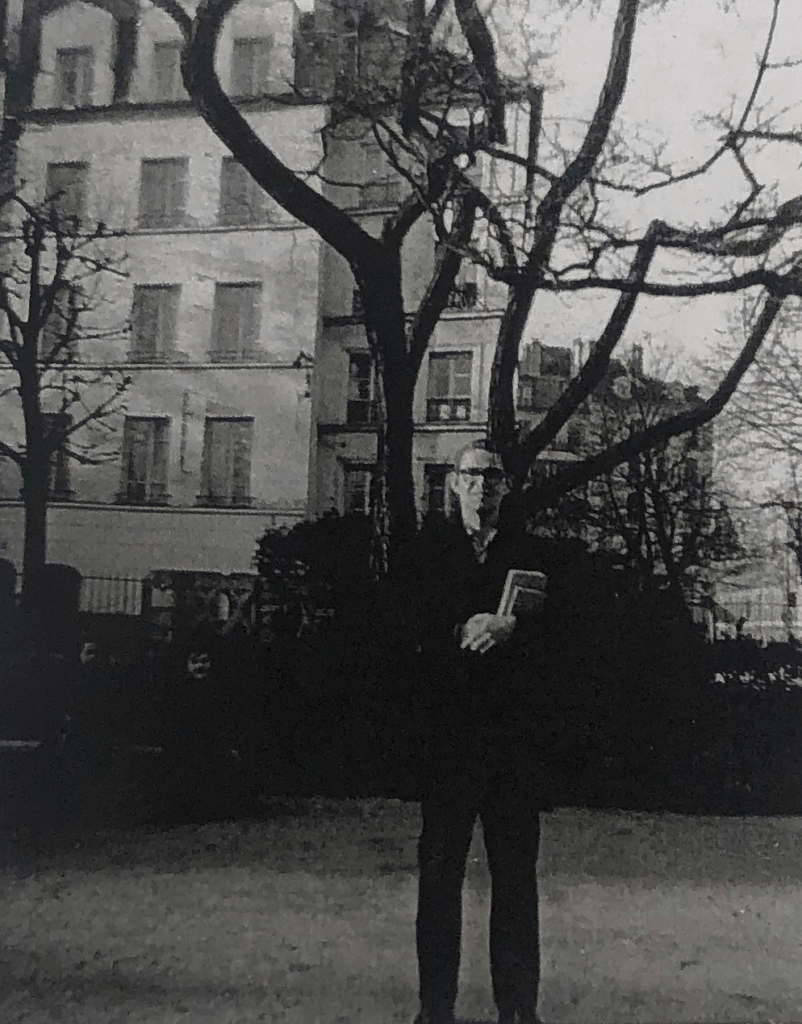
My first impressions of France were somewhat startling. The political climate in France was quite anti-American at the time. Everywhere there seemed to be signs: U.S. Assassins. Americans were not always well received. Of course, one cannot generalize. I did meet a friendly French couple who seemed quite fond of me and often invited me to restaurants and places of interest. They even presented me with a book about Paris with a dedication that read, “To our dear friend Laurent [my name in French] who has done more for Franco-American rapprochement than General de Gaulle.”
Paris at the that time seemed in some ways more charming and authentic than today. There were no skyscrapers for example. Modernity was shunned.
For most of the academic year, I rented a room at the quaint Hotel Esmeralda in the Latin Quarter, which was near the Sorbonne. Not knowing Italian at the time, I bought a record player and a set of records to learn Italian. I wanted to prepare for my first trip to Italy. Every day I would listen and repeat. This caused quite a stir in the hotel, and I was presented with a bill for using extra electricity. I was, however, able to communicate very well on several trips I made to Italy.
Excursions were organized for the students. I remember visiting Normandy and eating tongue (of the ox). In Strasbourg, near the border with Germany, I met several young children whom I naturally greeted in French. With great laughter they answered me in their local patois, which was heavily Germanic, all done in fun.
I should point out that it was a great challenge to transition to the French academic system. I never knew my professors personally, being one of several hundred students in a large lecture hall. Notes were taken and everything depended on the final test, which was so difficult that 50% was considered passing. Most of my time was consumed in serious study, and through persistence, I succeeded in obtaining the coveted French diploma.
The cosmopolitan atmosphere of Paris delighted me. It was easy to find people who spoke different languages such as Italian, Spanish, and of course, Arabic. I made many acquaintances and friends with foreigners. They had no trouble understanding my French.
Students could obtain meal tickets to eat in the university cafeterias. The meals were hardly “haute cuisine” but were very economical. I did enjoy my daily café au lait with crusty fresh bread. I learned to take wine with lunch and dinner, always with a choice of excellent cheeses. The croissants and pastries were always superb as well as fresh fruit from the provinces.
During the first few months of my stay in Paris, I resided in the fashionable 17th arrondissement, or district, in an elegant apartment that belonged to a widow. She was very demanding and not at all pleasant. All the rooms of the apartment had locked doors except the bathroom and my room.
I became friendly with Lola from Spain who did all the cooking and cleaning, working 12 hours daily. Since I knew Spanish, I was able to chat with her. The lady forbade me to speak with Lola and even refused to give me a receipt for the monthly payment of the room. I had the pleasure of visiting some relatives of Lola in Barcelona who received me very warmly at Christmas.
While living there, I often met a charming young lady who resided with her family in the same building. After a time she invited me to meet her parents. I was quite astonished but pleased to accept the dinner invitation. As is customary in France, I brought a bouquet of flowers. The parents did most of the talking and were very curious about me. The dinner of course was superb, and after dessert, the father offered me a glass of whiskey. When I declined he surprisingly said, “What’s wrong? All Americans drink whiskey.”
After returning to the U.S., I completed my senior year with a B.A. in French and a minor in Spanish. I am deeply indebted to the outstanding professors in the foreign language department such as Mrs. Genevieve Moise (French), Mrs. Alicia Portuondo (Spanish), and Mr. Alan Santinon (Italian).
In 1969, I obtained a master’s degree in French from California State College in Los Angeles. Although my dream was to become a college professor in French, I was note able to achieve this goal. This was due mostly to the scarcity of full-time positions. I did, however, teach French for many years on the high school and middle school levels. I particularly enjoyed teaching French to adults in adult education. I almost felt like a professor, often teaching French on an advanced level.
In a word, Monmouth College, now a University, prepared me very well for my life’s work teaching not only French but also Spanish, Italian, and English as a Second Language. Merci!
—Lawrence Pergola Jr. ’67